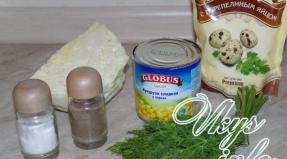Shelf life of duck eggs in the refrigerator. Storing chicken eggs in the refrigerator: tips and tricks
Eggs, like many millennia ago, are a demanded and irreplaceable product. Chicken eggs are considered the most affordable, so they are bought most often. They contain fatty acids, lecithin, choline, vitamins and a huge amount of chemical elements useful for the body. They contain calcium, zinc, selenium, copper, iodine, chromium, iron, manganese, potassium and other substances. Eggs are actively used in cooking, so it is not surprising that many housewives stock up on them for future use. However, this is not always effective. Eggs have a certain shelf life, after which they become unsuitable for food, that is, you can stock up on them, but not have time to eat them. So how long do you store your eggs and what is the best way to keep them fresh for longer?
Shelf life of raw and boiled eggs
How many eggs will stay fresh depends on where they are stored and at what temperature.
In the refrigerator, raw eggs are best stored at a temperature of +1 to +2 degrees.
- Under such conditions, table eggs do not deteriorate for 25 days.
- Diet - 7 days.
- Homemade eggs, if not washed before storage, will stay fresh for 3-4 months.
- A fresh egg without shell will not spoil for 2 days.
You can also store fresh raw eggs without a refrigerator. They will not deteriorate in about 2–3 weeks if left in a cool, dark place with 70–85% RH.
- Hard-boiled eggs, placed in an airtight container after cooking, can be stored in the refrigerator for up to 2 weeks.
- Without an airtight container, it is recommended to eat them within 10 days.
- If a hard-boiled egg is cracked, it will stay in the refrigerator for no more than 5 days.
Soft-boiled eggs spoil much faster.
- Their shelf life is 48 hours.
- A peeled boiled egg should be eaten on the same day.
Boiled eggs are best kept in the refrigerator at a temperature of +2 to +4 degrees.
- Outside the refrigerator, hard-boiled eggs can stay fresh for up to 3 days at temperatures below 20 degrees.
- Under the same conditions, a soft-boiled egg is stored for 24 hours.
How to store eggs in the refrigerator
Eggs will stay fresh longer if they are not stored in a special section located on the refrigerator door, and in the chamber for fruits and vegetables... The thing is that when the refrigerator is opened, warm air enters. As a result, eggs are exposed to constant temperature fluctuations, which negatively affects their freshness. It is better to store eggs on the refrigerator door only if they are eaten in a short time.
It is best to store eggs so that they are in a fixed position and certainly with the sharp end down so that the yolk is in the center and does not come into contact with the air layer. To do this, you can use both the box in which they were sold and a special stand. It is best to keep the container for storing eggs cardboard, because it helps maintain the necessary moisture and better protects eggs from extraneous odors. Eggs retain their freshness better if they do not come into contact with each other during storage.
Egg shells have a porous structure, so they can easily absorb other odors. For this reason, it is not recommended to store eggs next to products that have a strong smell: smoked meats, fish, citrus fruits, spices, mushrooms.
Eggs should always be washed just before use. If you wash off the protective layer when putting them in storage, they will rot much faster.
How to store eggs without a refrigerator
Fresh eggs keep well if close the pores of the shell... The best way to do this is to use pork fat. Vegetable oil will also work. After greasing, the eggs should be placed with the tip down in a box filled with dry oats, salt, sand, sawdust shavings, millet, wood ash or chaff. Eggs must be laid out in such a way that they lie at some distance from each other. From above, the product must be covered with burlap. In this form, chicken eggs, if stored in a place with low humidity and a temperature of no higher than 20 degrees, will not deteriorate up to 3 months.
Keeping eggs fresh will help salicylic acid... To do this, you need to make a solution in the proportion of 0.5 liters of water to 2 teaspoons of salicylic acid. The eggs should lie in this solution for half an hour, then dry them without wiping them and place them in a cool dry place. Thanks to this method, they do not lose their taste and properties throughout the month.
Can also store eggs in lime mortar... This method is good because it allows the eggs not to spoil until 3-4 months. However, it has a significant drawback - eggs acquire a specific unpleasant taste. In addition, the egg white that was stored using this method does not whip well. A pound of quicklime should be poured with 10 liters of boiled water. The resulting solution should be set aside for 10-12 hours so that it is infused. It must be stirred every 3 hours. Pour the prepared mortar into an earthenware dish with eggs laid out with the pointed end down. The lime solution should be several centimeters above the level of the eggs. Thus, eggs should be stored in a cellar or basement, that is, where it is dry and cool.
Eggs are a low-calorie product endowed with beneficial properties by nature. They contain vitamins, minerals, antioxidants. Housewives usually face the question of how much boiled eggs can be stored in the refrigerator when they accumulate in large quantities in the household. before and after Easter celebrations, because this is the time of the most real abundance of eggs in any home.
Refrigeration: what affects shelf life
One or two dozen - in this amount, the hostess's product is usually bought for one family. They deteriorate quickly enough, so it is better to understand the shelf life of eggs before storing a large volume. In our case, it all depends on two things:
- how long it took to prepare them;
- exactly how they were cooked.
Hard-boiled eggs have a shelf life of 5 to 7 days. When preparing the product "in a bag" or soft-boiled, the period is reduced to 2 days. Eggs with shells cracked during cooking also have a short shelf life - 2-3 days.

For eggs with Easter coloring, the shelf life does not change only if natural dyes are used, such as onion peels, beet juice, turmeric and others. They are suitable for consumption for a maximum week. The use of thermal film for decoration reduces the shelf life by two days, since thermal exchange is disturbed. In addition, if the decoration procedure was carried out with errors, water accumulates under the film. After about a day, an unpleasant odor appears.
How many days can you store in the refrigerator if they are shelled? The question is also relevant for housewives. Their terms have been set for such cases as well. Putting eggs in a container and putting them in the refrigerator, you can count on the safety of the product within three days.

What affects the shelf life of eggs
The shelf life of boiled eggs is influenced by a number of reasons. Among them are:
- what degree of freshness was the product at the time of purchase, what were the conditions of its storage;
- whether the egg preparation technology was followed - the product chilled in the refrigerator should not be immediately immersed in boiling water, so cracks on the shell can be prevented, which cause their premature spoilage;
- Have the eggs been inspected before the end of cooking, if there are cracks, then the shelf life is reduced.
Storage conditions for eggs in the refrigerator
It is imperative to exclude the contact of eggs with raw meat and fish products. It is better not to leave them for storage in the cells of the refrigerator, since when the doors are opened, temperature drops occur. A container is more suitable for storage. It will prevent other fridge odors from being impregnated. The dishes can be enameled, metal, plastic. Thus, how long boiled eggs can be stored in the refrigerator depends on the storage location - the door or shelf of the refrigerator.

Some sources say that boiled eggs in the refrigerator can stay up to twenty days. But you shouldn't really trust this. These storage times are realistic for antibiotic products. For many producers, it is the norm to add them to their poultry food. This increases the shelf life of eggs, protects against animal diseases. Also, the products end up with buyers towards the end of their shelf life, they can be counted by the date of production. Accordingly, it becomes unusable faster.
Thus, how much raw eggs can be stored in the refrigerator must be determined taking into account the listed conditions in each case individually.
How long should eggs be stored in the refrigerator? To answer this question, you need to consider factors such as the shelf life of the eggs and the storage conditions of the eggs. The expiry date printed on the box of eggs by the producer is actually the "packing date", which indicates the date the eggs were packed. The period of use should be counted from the date of production of eggs by the chicken.
So how much eggs should you keep in the refrigerator? When stored properly, the shelf life of eggs should be as follows:
Shelf life of eggs decreases significantly and can become unsafe to eat if eggs are not kept chilled at all times. Eggs should be refrigerated immediately before and after use. But remember that eggs, like many other dairy products, tend to have an expiration date, not a consuming date. Because of this difference, you can safely use eggs to cook your favorite meals even after the expiration date has passed, but please consume before the consuming date. Those. You can use eggs with an expired shelf life (as shown on the package), but do not use eggs with an expired shelf life (as shown in the table above).
How do you know if an egg is missing or not?
The most common question is how to find out missing egg or not lost? While not entirely correct, your senses are usually the most reliable tools to tell if your eggs are missing. To find out if you can eat eggs or not, look at the egg white. The freshest eggs are usually white in color. The white of old eggs becomes darker. In addition, if the egg white is pinkish or iridescent in color, or if it has a slight odor, then the egg is spoiled. If you break an egg and smell any smell, discard it immediately, it is gone. Remember that there are certain health risks associated with eating spoiled eggs. This includes the dangerous Salmonella and E-Coli strains of bacteria (which are not visible). So remember to consume your eggs before the date above.
Testing eggs with water.
When determining, what time is the egg, many people use water for dough. While not a 100% accurate test, it allows you to tell if an egg is missing or not without breaking it. If you are interested check eggs, just submerge them in water. A good egg should sink to the bottom and stay there. An older egg will hang over the bottom, but you can eat it too. If an egg floats on water, bacteria have invaded the protein and form gases, which is a sign that the eggs are probably not safe to eat. While this quick test can lead to false results, we think it's better to play it safe than sorry and any eggs that fail this test should be thrown away.
How to store eggs correctly?
Store for a long time eggs can be refrigerated in a container. The container will keep the necessary moisture and will not let in a lot of bacteria from other food products. It is not recommended to freeze raw eggs, as after that they will turn into a homogeneous mass and at the same time they can no longer be used for baking. You can only freeze ready-made eggs, boiled or fried.
What if you have a lot of eggs?
If your eggs are nearing the end of their shelf life, you can extend them. shelf life for a week just by hard-boiling them.
- The average hen lays 250 to 270 eggs per year.
- Egg white contains no cholesterol at all. All cholesterol is found in the egg yolk.
The egg is a frequent guest in every home. This product has a wide range of applications, therefore it is very popular. Eggs can be cooked as a separate dish or as part of a complex culinary masterpiece; baked goods rarely do without them.
They are often found as ingredients in various dishes. Moreover, not only chicken eggs are very popular, although they are leaders among their own kind, but also goose and quail eggs. How long can eggs be stored in the refrigerator? Despite the wide distribution of delicacies, this information is not known for certain to every housewife.
How fresh is the product?

Eggs come to the table in different ways, someone buys them in the store, some prefer to take them from the farmers in the market, while others keep the farm themselves and have a home product. When it comes to the purchase issue, it is best to purchase a store product, since in this situation the egg will be marked and have a production date, from which you can start by determining how and how much to store the purchase. Testicles purchased on the market may not be the freshest, you should be careful with this.
Advice! When using eggs for cooking, don't break it directly into the bowl with the rest of the ingredients. Better break it into a separate container and pre-check for freshness.
How is freshness determined? There are several options. The most common is to put the specimen in a container of salt water. If it is fresh, it will lie on its side in a horizontal position. A weekly specimen will take a position at an angle of 45 degrees, the egg of which for 2-3 weeks will be located vertically, tip down. If the product floats up, dispose of it carefully, being careful not to break it.
It is also possible to shake the questionable product near the ear. A high-quality egg does not make sounds, if you hear squelches, feel free to throw it away. If, in a broken state, it is found that the protein has a turbid structure, then it is worth abandoning its use.
Storing chicken products

Eggs can be stored not only in the refrigerator. Depending on the quantity, housewives may find useful information not only about storage in the refrigerator, but also without it.
Advice! When storing eggs for storage, it is important not to wash them. The shell has a coating that protects against the penetration of air and pathogenic bacteria. At the same time, it is imperative to wash them before use.
Without refrigerator
How many days are eggs stored without a refrigerator? How to keep them longer? These questions often arise among novice poultry farmers, when the chickens have already begun to actively lay, and the marketing has not yet been established. There are several options to be aware of in this case.
- The surface of the eggs is greased with fat or vegetable oil. The egg is placed with the tip down in a box, the bottom of which is covered with shavings, ash and other loose substances, in order to avoid the eggs touching each other and breaking. The container is covered with a thick cloth and placed in a cool room with a temperature of no more than 10 degrees. In this way, the product can be stored for up to 3 months.
- Slaked lime will help to extend the shelf life up to 6 months. To do this, the testicle is placed with its tip down in a container of lime. After all the copies are placed, you need to completely fill them with a solution to hide the product from the eyes. The storage temperature should be quite low, down to -10 degrees. This method has a negative feature, eggs preserved in this way have a characteristic flavor.
In fridge

How long can you store chicken eggs? Many will say that from the moment the chicken laid home eggs, you can count 28 days and this will be the right time. And they will turn out to be absolutely right, but subject to some additional requirements.
The first and most important requirement is the temperature regime. The storage temperature should not exceed 2 degrees. Despite the fact that the compartment for eggs, located on the door of the refrigerating device, does not reach the norm, its temperature regime is on average about 8 degrees. Therefore, it is better to place the testicles on the bottom shelf of the refrigerator compartment.
Advice! If the testicles are in a special container, then the best option would be to place them with the tip down.
How much eggs can be stored raw in the refrigerator depends on how the product will be eaten. Testicles intended for fresh consumption should not be more than 7 days old. A product aged 1-3 weeks requires boiling, with eggs over 21 days old should be hard boiled.
Boiled product
How long can boiled eggs be stored in the refrigerator? Boiled specimens lose significantly in terms. Hard-boiled specimens can be stored for up to 7 days, but only if the shell is intact. The shelf life of boiled eggs, peeled or with damaged shells, is reduced to two days.
Where the boiled testicles will be stored does not matter. They are not as demanding on temperature conditions as their raw counterparts. How much is it possible to extend their shelf life? In this case, the time limit is strictly limited and a copy lying longer than the prescribed time may cause harm to health.
We store quail products

How many days can quail eggs be stored? This type of product is also entrenched in the everyday life of most housewives. They are not only tasty, but also very healthy.
Quail eggs are stored at higher temperatures. The egg compartment in the refrigerator door works great for them. Moreover, even at room temperature, they can be stored for a whole month. And at temperatures from 0 to -5 two months.
As you can see, there is nothing difficult about storing testicles. Under certain conditions, they can be stored for a fairly long period of time. Approach the issue of storage correctly and eat only high-quality foods.
12/09/2013
Every woman, as a hostess in the kitchen, wants to protect herself and her family from food poisoning. It is sometimes very easy to spot missing food, as we are most likely to notice mold or foul odors, but what about eggs stored in the refrigerator?
How long is the shelf life of eggs in the refrigerator?

If you buy eggs from the supermarket, always look at the packing date. Experts say that the egg's optimum qualities are maintained for the next 30 days after being laid by the hen, provided it is kept in the refrigerator. This means that over the next month, the egg yolk will be bright, round and convex, the white is transparent and viscous, and the membrane under the shell is perfectly white.
If you buy eggs from a market where it is impossible to determine the date of their laying, we recommend that you adhere to the rule of three weeks - i.e. eggs are preferably used for food within the next three weeks.
In principle, you can use eggs older than one month, but it is best to make an omelet from them, since the properties of eggs change after long-term storage, and this can adversely affect, for example, baking.
How do you know if your eggs have gone bad?

Eggs are one of the few animal products that can be stored in the refrigerator for a long time without worrying about the health of your family members. What's more, eggs are unlikely to go bad in the refrigerator over time. The only thing that threatens them is gradual drying out. The use of eggs within 30 days is only a recommendation, which does not mean that after a month of storage, they will immediately become a spoiled product.
If the eggs are not contaminated with salmonella, you are safe. But even if Salmonella is present, the bacteria will be too small because they do not thrive in the cold climate of the refrigerator. Plus, good food hygiene and proper handling of eggs and other foods before eating will kill any germs that can threaten your health.
Read also ...
- Chicken liver pate
- Delicious zucchini with cheese in sour cream in the oven - a step by step recipe with video Zucchini recipes in the oven with sour cream
- Banana rice and corn flour pancakes (gluten free) with homemade banana sauce Banana pancakes with semolina
- Cabbage casserole with chicken Chicken fillet casserole with cabbage



















